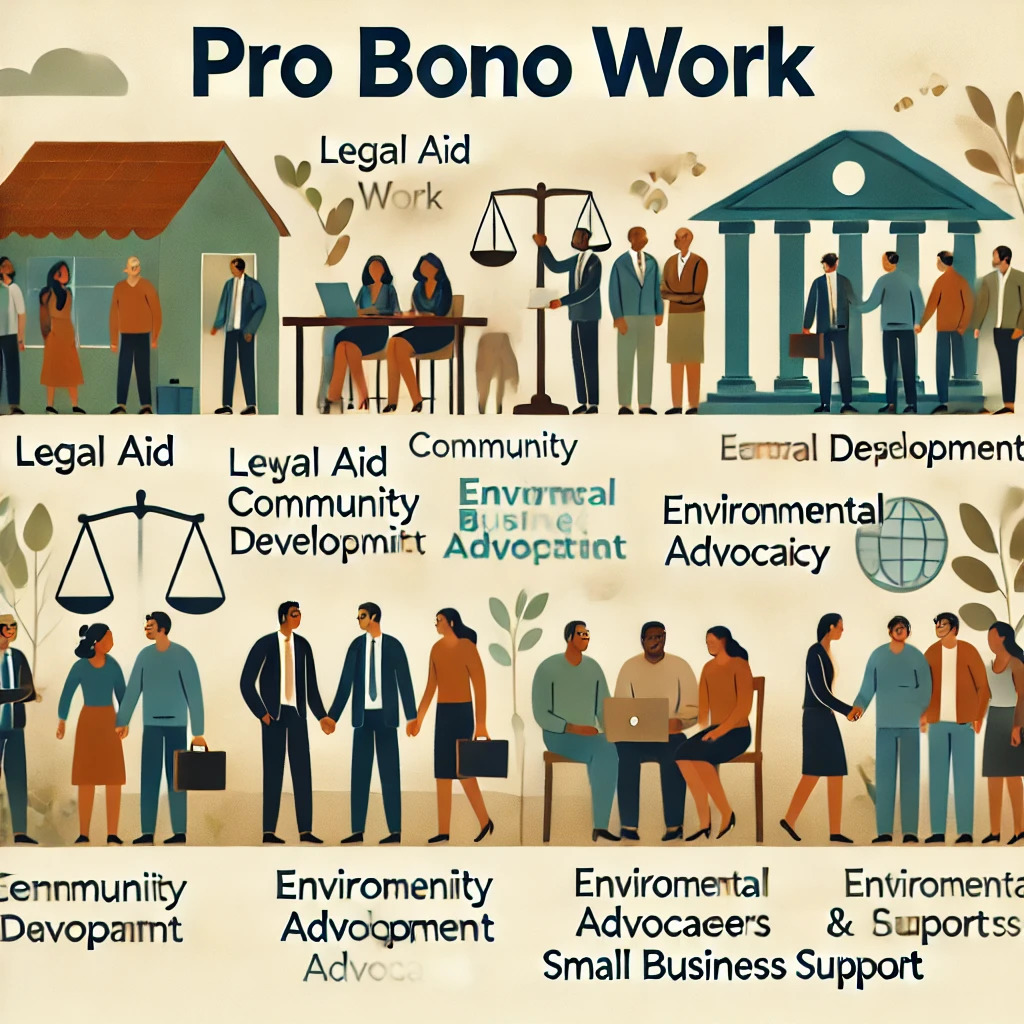View News
Pro-Bono-Work-Connecting-Expertise-and-Social-Need

Pro Bono Work: Connecting Expertise and Social Need
~ Sura Anjana Srimayi
Introduction
Pro bono work, derived from the Latin term "pro bono publico" meaning "for the public good," refers to the practice of offering professional services without charge to benefit society. It is a powerful means of using specialized skills to address social needs, particularly for underserved populations and non-profit organizations. In a world often driven by profit, pro bono service provides a counterbalance by promoting social justice and equity.
The concept of pro bono work is rooted in the ethical responsibility of professionals to use their expertise for societal benefit. Unlike simple charity, it reflects a deeper commitment to social responsibility. Lawyers, accountants, consultants, engineers, and other professionals engage in pro bono work to contribute positively beyond their paid assignments.
Why Practice Pro Bono?
Professionals choose to engage in pro bono work for a variety of reasons, including ethical, personal, and professional motivations. Many professionals feel a strong ethical obligation to use their skills to benefit those who are disadvantaged or marginalized. This sense of duty often stems from their belief in contributing to the public good.
Pro bono work also offers opportunities for skill development and enrichment. By working on projects in unfamiliar or challenging environments, professionals can enhance their expertise and gain practical insights that they may not encounter in their usual paid assignments. Additionally, contributing to a meaningful cause provides personal satisfaction and fosters a sense of purpose, enhancing overall well-being and job satisfaction.
For firms and individuals, pro bono work can also strengthen reputations and build brand value by showcasing a commitment to social responsibility. It can enhance credibility, attract clients who value ethical practices, and create a positive public image. Furthermore, engaging in pro bono work enables professionals to expand their networks by forming relationships with other like-minded professionals, non-profit organizations, and community leaders.
Finally, pro bono service has the potential to drive social change by addressing systemic issues. By working towards policy reforms, advocating for vulnerable populations, and supporting community initiatives, professionals can make a significant and lasting impact.
Where Does Pro Bono Work Happen?
Pro bono services are extended across various sectors. Legal aid clinics often provide legal representation and consultation to low-income individuals on matters such as housing, family law, and immigration. Non-profit organizations benefit from consulting, accounting, marketing, or technology services, helping them enhance operational effectiveness and broaden their impact.
Community development projects also rely on pro bono expertise to advance infrastructure, education, and healthcare. Environmental advocacy groups benefit from the contributions of professionals who offer their knowledge on sustainability and conservation. In addition, small businesses in underserved communities often receive financial and strategic consulting, empowering entrepreneurs and fostering economic development. International development organizations further benefit from pro bono assistance, particularly in regions facing economic or social challenges.
How Is Pro Bono Work Done?
Pro bono work follows a systematic approach to ensure effective results. Professionals identify opportunities through professional associations, non-profit organizations, or pro bono clearinghouses. They assess their own skills and interests to select projects where they can provide the most value.
Once an opportunity is selected, professionals collaborate with the client or organization to set clear expectations regarding the scope of work, timelines, and deliverables. Maintaining high standards of professionalism and ethical conduct is essential, as pro bono work deserves the same level of commitment as paid assignments.
To measure success and ensure accountability, it is important to document the work undertaken and assess its impact. Evaluating the outcomes not only demonstrates the effectiveness of the intervention but also highlights areas for future improvement.
Case Study: Pro Bono Impact in Microfinance
A microfinance institution (MFI) operating in rural India provides small loans to women entrepreneurs but faces challenges related to operational efficiency, financial sustainability, and impact measurement. A pro bono team of consultants offers their services to assist the MFI in overcoming these difficulties.
The consultants conduct a financial review to evaluate the institution's profitability, liquidity, and solvency. They identify areas for improvement in loan portfolio management and cost control. Additionally, they analyze operational processes to identify inefficiencies and recommend measures to streamline loan disbursement and repayment procedures.
To demonstrate the MFI’s social impact, the consultants design a comprehensive impact measurement framework. This framework enables the organization to track its effectiveness and present concrete results to donors and investors. Further, a targeted marketing strategy is developed to enhance the MFI’s visibility and attract new clients, contributing to its financial sustainability.
Through these pro bono interventions, the MFI significantly improves its operational performance and strengthens its financial health. As a result, it expands its reach, empowering more women entrepreneurs and contributing to poverty alleviation in the region.
Conclusion
Pro bono work is a valuable avenue for professionals to contribute to a more equitable and just society. By applying their expertise to serve social needs, they leave a lasting impact beyond their paid work. As global challenges continue to grow, the need for pro bono service is more urgent than ever.
Professionals are encouraged to embrace their ethical responsibility and use their skills to make a meaningful difference. In doing so, they help build a sustainable, inclusive future for all.
"Unlock the Potential of Legal Expertise with LegalMantra.net - Your Trusted Legal Consultancy Partner”
Disclaimer: Every effort has been made to avoid errors or omissions in this material in spite of this, errors may creep in. Any mistake, error or discrepancy noted may be brought to our notice which shall be taken care of in the next edition In no event the author shall be liable for any direct indirect, special or incidental damage resulting from or arising out of or in connection with the use of this information Many sources have been considered including Newspapers, Journals, Bare Acts, Case Materials , Charted Secretary, Research Papers etc.

